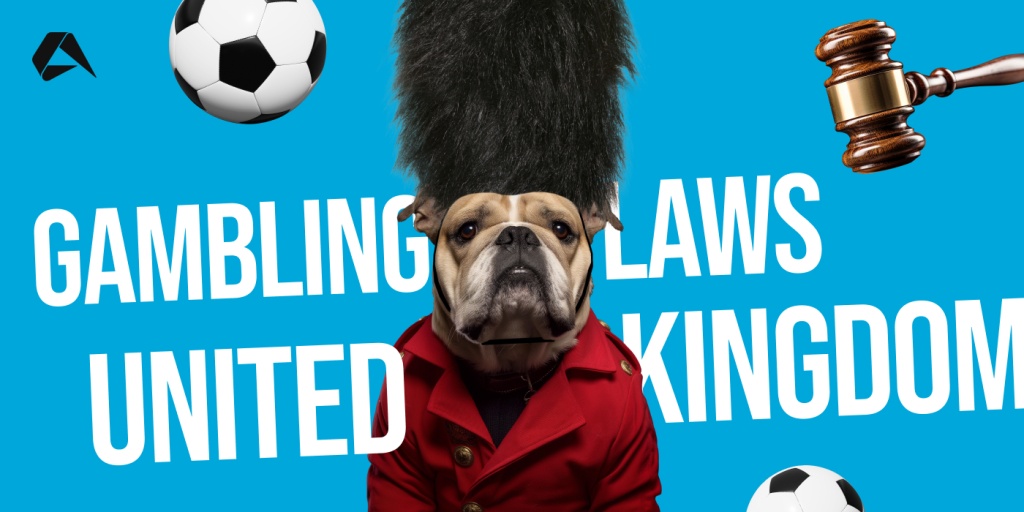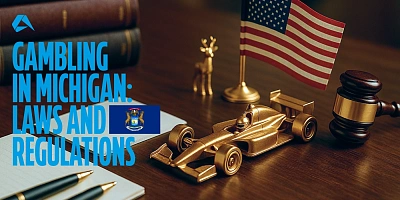Overview Gambling Laws in the UK - All You Need to Know About Regulation and Legality in 2024
The UK's gambling sector is governed by stringent laws, making UK Gambling Commission (UKGC) licensed platforms among the most trusted in the industry. Evolving from 17th-century popularity and 19th-century regulation attempts, significant liberalisation began with the 1994 National Lottery, culminating in the 2005 Gambling Act and the establishment of the UKGC. By 2014, a UKGC licence became mandatory for operators serving UK residents.
Today, the legal landscape in 2024 sees gambling widely accepted, underpinned by robust measures against illegal practices and for responsible engagement. The UKGC acts as the primary regulatory body, overseeing licensing, fair play, consumer protection, and anti-money laundering (AML) standards. Other key regulators include the Advertising Standards Authority (ASA) for marketing compliance and the Financial Conduct Authority (FCA) for financial transactions.
Obtaining a UKGC licence requires meeting stringent criteria, including clear identity and ownership, financial stability, criminal checks, robust AML compliance, customer fund protection, and demonstrable fairness of software and games. Operators must also implement responsible gambling measures, such as self-exclusion tools and deposit limits, and adhere to strict advertising rules. While initial application and annual fees vary based on gross gambling yield (GGY), and taxes like the Point of Consumption (POC) Tax apply, a UKGC licence provides legal access to a lucrative market (estimated £14.5 billion GGY in 2024). It significantly enhances an operator's credibility, trustworthiness, and facilitates strategic partnerships, offering a competitive edge despite demanding compliance efforts and higher costs compared to other jurisdictions. The application process can take approximately 16 weeks.
Gambling laws in the United Kingdom are stringent, which is why iGaming platforms that hold a UKGC license are considered among the most trusted options in the industry. However, depending on the games and products offered, as well as your business goals, there may be better alternatives for your operation.
This article provides insight into UK gambling law and compliance, the pros and cons of a UKGC license, how to apply, and the fastest and most cost-efficient way to access one of the world’s most engaged and diverse gambling markets.
The Evolution of Gambling Law in the United Kingdom
Gambling has been a popular pastime among both the general population and nobility since the 17th century, when horse racing became the "sport of kings," a phrase inspired by Prince Charles II’s deep passion for the activity. Frost fairs were held on the frozen River Thames, where wagers were placed openly, and dice games, card games, and primitive lotteries were common in the streets. By the late 1700s, Harry Ogden became the first known person to offer odds on horses, laying the foundation for modern-day bookmaking in 1790.
The 18th and 19th centuries saw growing pressure to regulate gambling and mitigate its social consequences, such as debt and poverty. Initial legislative efforts came in 1845 and 1853, with acts that made gambling contracts legally unenforceable. While this reduced gambling among the upper classes, it had limited impact on working-class betting. The Street Betting Act of 1906 criminalized betting activity, yet underground rings and illicit betting shops continued to spread.
In response, the government enacted the Betting and Lotteries Act of 1934 and the Betting and Gaming Act of 1960. These laws acknowledged the enduring demand for gambling and legalized off-course betting, casinos, betting shops, and bingo halls—under strict regulation. The introduction of the National Lottery in 1994 was a significant milestone, signaling a broader shift toward regulation and public acceptance.
This trend continued into the 21st century with the creation of the UK Gambling Commission in 2005. By 2014, any operator offering gambling products to UK residents—regardless of where the operator was based—needed a UKGC license. In recent years, the Commission has prioritized measures to protect vulnerable populations and increase public safety.
Here’s a timeline outlining key regulatory milestones as the UK transitioned from restriction to a more open, regulated gambling environment:
1845 and 1853: Gaming Acts introduced to restrict and control gambling activity.
1906: Street Betting Act enacted.
1934: Betting and Lotteries Act legalizes various forms of betting.
1960: Betting and Gaming Act legalizes gambling establishments.
1968: Gaming Act imposes stricter licensing conditions.
2005: United Kingdom Gambling Commission (UKGC) established.
2014: Remote Gambling Act mandates licenses for online operators.
2020 and 2021: Introduction of mandatory age verification and safety checks.
Current Legal Landscape in 2024
Today, gambling is broadly recognized as a mainstream leisure activity in the UK, with options ranging from online betting platforms to traditional racecourses, bingo halls, and casinos. The public’s interest is balanced by strict laws that aim to eliminate illegal practices while promoting responsible gambling.
The legal foundation is anchored by the Gambling Act 2005 and enforced by the UK Gambling Commission. This framework ensures that all operators uphold fair, transparent, and responsible practices. Online platforms must implement robust identity checks, self-exclusion tools, and spending limits. Additionally, gambling transactions via credit cards are prohibited across all platforms.
Advertising regulations have also become stricter. All promotional material must clearly state the risks involved in gambling and avoid targeting vulnerable groups. In short, the UK's gambling legislation is designed to support a secure and ethical marketplace, ensuring operators uphold high standards of compliance, safety, and public trust.
Regulations and Compliance for Online Gaming Operators
To legally offer gambling products and services in the UK, online gaming operators must follow strict UKGC regulations. Key requirements include:
Licensing: Obtain a license from the UK Gambling Commission. This includes meeting criteria for consumer protection, fair gameplay, financial solvency, and AML (Anti-Money Laundering) compliance.
Protection: Enforce identity and age verification to prevent underage gambling. Checks must occur before deposits and access to real-money gameplay.
Responsibility: Provide responsible gambling tools such as deposit limits, self-exclusion, and visible support resources.
Advertising: Ensure all marketing complies with the Advertising Standards Authority (ASA). Ads must not mislead, glamorize gambling, or appeal to minors or high-risk individuals.
Financial: Comply with AML regulations and report suspicious activity. Routine audits and financial transparency are mandatory.
Criteria for Obtaining a UKGC Gambling License
To qualify for a UKGC gambling license, operators must meet comprehensive criteria designed to ensure integrity, transparency, and consumer protection. The following conditions must be satisfied:
1. Identity and Ownership – Clearly outline company ownership and management structure.
2. Business Location – Depending on the license type, businesses must be UK-based or maintain a UK-registered address.
3. Criminal Background Checks – Background screenings are conducted for the company and key personnel.
4. Financial Stability – Prove financial solvency and demonstrate the ability to pay out winnings.
5. AML Compliance – Undergo AML risk assessments and demonstrate procedures to prevent financial crimes.
6. Customer Fund Protection – Establish safeguards to protect player funds in the event of insolvency.
7. Integrity and Competence – Demonstrate no previous regulatory violations and a competent leadership team.
8. Software and Game Fairness – Certify gaming software via independent third-party testing.
9. Technical Standards – Comply with UKGC data security and player protection protocols.
10. Responsible Gambling – Implement policies to detect and reduce problem gambling behavior.
11. Advertising and Marketing – Ensure clarity and transparency in all promotions and ad campaigns.
Licensing Fees and Taxes
To obtain and maintain a gambling license, iGaming operators are subject to specific fees and taxes.
License Application Fees
The initial application cost does not include the annual fees required to maintain the license after it’s issued. Prospective applicants should always consult the latest data from the UK Gambling Commission’s official website, as these fees are regularly reviewed and may change.
Application fees for a UK Gambling Commission (UKGC) gambling license vary significantly based on the type of operation and category. Here’s a general guide:
Remote Gambling Licenses
Operators with GGY < £550,000 = approx. £2,640
Operators with GGY > £1 billion = approx. £57,304
Non-Remote Gambling Licenses (Land-Based)
Starts at £5,341 for small casinos, with higher fees based on GGY
Software Licenses
Gambling software providers with GGY < £550,000 = approx. £3,719
Gambling software providers with GGY > £100 million = approx. £24,905
License Annual Fees
Annual fees cover compliance, auditing, and enforcement activities. These fees help ensure operators meet high safety and fairness standards. Operators should use the UKGC’s license fee calculator to confirm the most current costs.
Remote Gambling Licenses
Small Operators with GGY < £550,000 = approx. £2,604
Operators with GGY > £5 million = approx. £157,753
Non-Remote Gambling Licenses (Land-Based)
Starts at £5,341 for small casinos, with higher tiers based on GGY
Betting Operation Licenses
Betting shops – from £2,709 per physical premises
Remote Betting – GGY < £550,000 = approx. £2,709, rising to GGY > £100 million = approx. £409,267
Point of Consumption Tax (POC)
In the UK, gambling tax is applied as a percentage of profits, regardless of where the operator is based. Relief for double taxation is available through provisions for General Betting Duty (GBD), Remote Gaming Duty (RGD), and Pool Betting Duty (PBD).
Profits are calculated as the total stakes received minus the winnings paid out (from and to UK customers, as applicable).
Operators must register with HMRC and pay one or more of the following gambling-related taxes if conducting business within or targeting users in the UK:
General Betting Duty (GBD)
15% – fixed odds and totalisator bets
3% – financial spread bets
10% – all other spread bets
15% – commission collected by betting exchanges from UK users
Pool Betting Duty (PBD)
15%
Remote Gaming Duty (RGD)
15% before April 1, 2019
21% on or after April 1, 2019
If you supply remote gambling services (excluding spread betting) to customers who do not normally reside in the UK, you are not liable for these taxes on those specific transactions.
Other Taxes
Operators typically face other financial obligations, including standard corporate tax and VAT where applicable. However, gambling activities are generally VAT-exempt in the UK.
Regulatory Bodies for Online Gambling
Several organizations are responsible for creating and regulating gambling laws in the UK. iGaming operators generally engage with only a few of these at the national level. In contrast, land-based venues like betting shops and casinos may also need to adhere to local council requirements for licenses.
United Kingdom Gambling Commission (UKGC)
Established under the Gambling Act 2005, the UKGC is the central authority overseeing gambling in the UK. It regulates all facets of the online gambling industry—issuing operator licenses, enforcing fair play, ensuring consumer protection, and monitoring anti-money laundering (AML) compliance. The Commission has the power to enforce rules through audits, impose fines, and revoke licenses for violations.
Advertising Standards Authority (ASA)
The ASA is responsible for enforcing advertising standards across the UK, including those related to gambling. Its goal is to ensure all gambling ads are truthful, fair, and non-misleading. Operators must comply with ASA guidelines that prohibit targeting minors or linking gambling to financial success or attractiveness. The ASA also has authority to require retractions or amendments and penalize repeat offenders.
Financial Conduct Authority (FCA)
Although not directly responsible for gambling regulation, the FCA oversees the financial and payment systems that gambling operators rely on. Operators must maintain secure payment environments, conduct due diligence, and monitor for suspicious financial activity. Adhering to FCA requirements enhances operational integrity and helps mitigate financial crime risks.
Advantages for Operators in the UK
A UKGC license might not be the easiest or most affordable to obtain, but it offers significant advantages for iGaming operators, beyond the necessity of accessing the UK market.
Most importantly, it allows legal entry into one of the world’s most lucrative gambling markets. The UK's gross gambling yield (GGY) is projected to exceed £14.5 billion in 2024, supported by innovation, digital transformation, and strong user engagement.
A UKGC license significantly boosts an operator’s credibility and appeal to both UK-based and international players who prioritize fairness and security. It also streamlines partnerships with top-tier payment platforms and technology vendors—key advantages for expanding business reach and negotiating leverage.
Advantages
Strategic benefits of holding a UKGC license include:
-
Access to one of the world’s most mature, engaged, and diverse gambling markets.
-
Enhanced reputation—UKGC licenses are a recognized symbol of transparency and trust in the industry.
-
Increased operational stability by aligning with robust compliance frameworks, reducing legal risks.
-
Higher investor confidence due to strong adherence to legal and ethical standards.
-
Competitive advantage—being licensed by the UKGC differentiates your brand in a highly regulated space.
-
Supports long-term business growth and enhances your global positioning in the iGaming sector.
Disadvantages
Like any gaming license, holding a UKGC license also presents some challenges when compared to alternative European licensing options:
-
Regulatory standards are demanding, and maintaining compliance can be both costly and time-consuming.
-
The cost of obtaining and maintaining a UKGC license is typically higher than in most other jurisdictions.
-
Tax obligations in the UK are relatively high, which can affect overall profitability.
-
Restrictions on flexibility, as UK regulations may limit the types of games and betting products operators can offer.
How to Apply for a UKGC Gambling License
iGaming operators must go through a detailed application process to obtain a gambling license in the UK, ensuring full compliance with strict regulatory standards. Here’s a step-by-step guide:
The Application Process
Step 1: Confirm that the business meets all identity, ownership, and integrity requirements. This includes background checks, financial assessments, and evidence of anti-money laundering controls.
Step 2: Submit the application to the UKGC, along with detailed documentation about your operations, product types, and player protection protocols.
Step 3: Calculate and pay the required license application fee at the time of submission. This fee varies based on license type and scale of operations.
Step 4: Demonstrate compliance with technical and software fairness standards. This may include third-party audits and certification.
Step 5: Wait for the UKGC’s decision. The commission thoroughly reviews submissions to ensure regulatory compliance. Additional information may be requested. If all criteria are met, a license will be issued.
Post-Licensing Commitments
Once licensed, iGaming operators are subject to ongoing compliance requirements, including routine audits and reporting obligations to maintain alignment with UKGC standards.
An annual fee must be paid to maintain the license. These funds help support enforcement activities and the commission’s regulatory work.
Further Notes
1. A UKGC gambling license does not expire unless it is suspended, revoked, or voluntarily surrendered.
2. Operators must register at least 31 days before launch, unless they are based in the UK, EU, Gibraltar, Isle of Man, Norway, Faroes, Iceland, New Zealand, or South Africa. For these jurisdictions, registration must occur at least 14 days prior to starting operations.
3. The standard processing timeline is approximately 16 weeks, assuming all documentation is complete at submission.
Fast Track Access to a UKGC Gambling License
The fastest and most cost-effective way to legally access the UK market is through the UKGC-licensed product from Altenar, a trusted iGaming software provider.
Get in touch with our team today to learn how to launch a flexible iGaming platform in weeks—not years.
Disclaimer
This article is for informational purposes only and should not be considered legal advice. The content is based on publicly available sources and general industry knowledge. For legal matters, always consult a qualified attorney. Altenar assumes no liability for decisions made based on this material.













